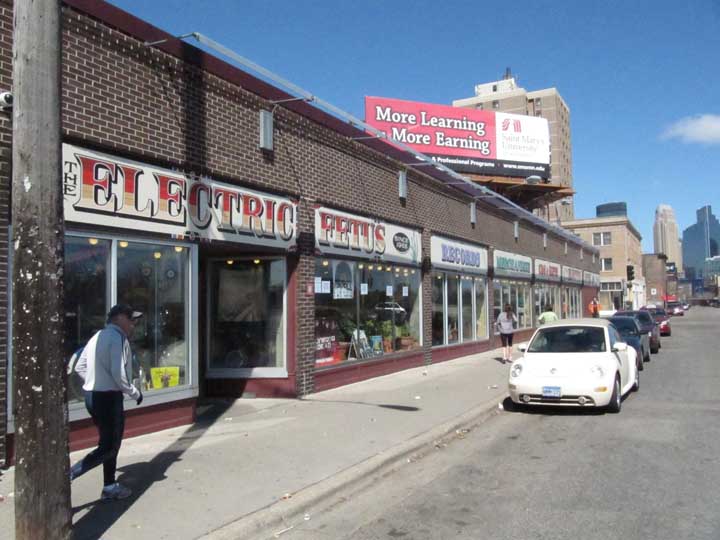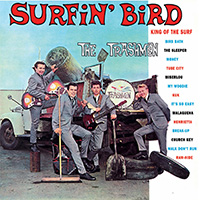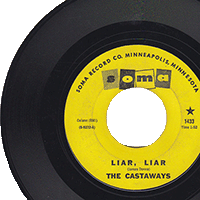Electric Fetus
Much of the information on this page about the Electric Fetus comes from “A History of the Electric Fetus,” prepared by Penny A. Peterson and Charlene K. Roise for the Greater Twin Cities Blues Music Society in July 2006. This very comprehensive history has much more detail than will be found here. Material taken from that document will be abbreviated as “Blues Music Society.”
The Fetus has had three different locations during its lifetime:
- 521 Cedar Ave. South: 1968 to 1969
- 514 Cedar Ave. South: 1969 to 1972
- 2000 Fourth Ave. South: 1972 to present
1968
521 CEDAR AVE SO.
FOUNDERS
U of M students Ron Korsh and Dan Foley opened the Electric Fetus music store on June 10, 1968, to sell the psychedelic rock music they heard coming out of San Francisco.
Korsh, a student in the architecture school, was unhappy with a studio project assigned to him. He decided to quit school and look for a money-making enterprise. He noticed a storefront for rent. “At that point, I was already thinking about opening a store of some sort. Perhaps a record store as I had an interest in music.” The space rented for about $18 per month. (Blues Music Society)
Foley remembered the beginning somewhat differently. Foley and Korsh were up late one night listening to the new music coming from San Francisco and London. Korsh asked, “Why not open a record shop?” Although neither had any experience in running a store, they decided to do it. Foley used his student loan money, less than $5,000, as start-up capital for the store. Foley never completed his degree in child psychology. He says his education got “sidetracked by the times.” (Blues Music Society)
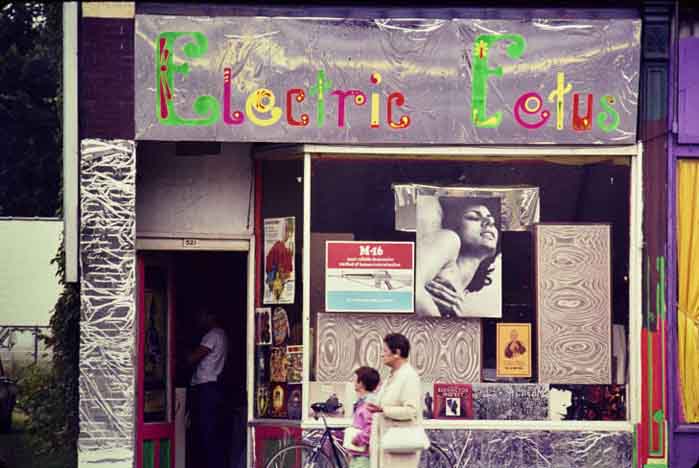
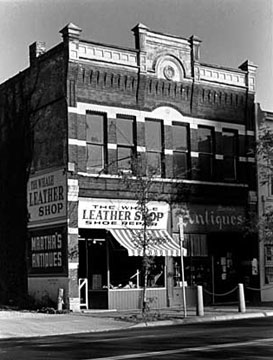
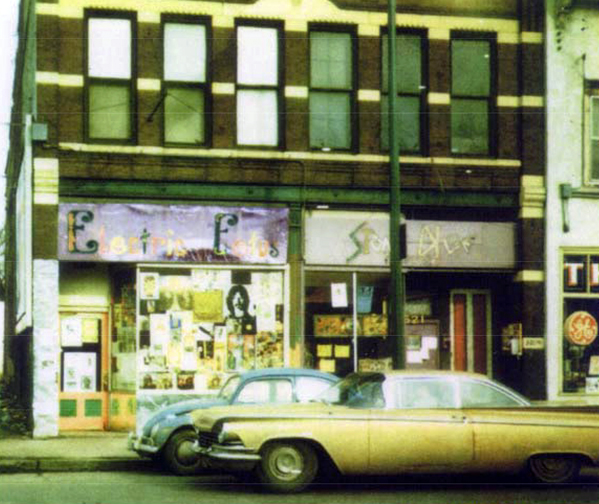
THE NAME
One story of the genesis of the name was that it was after the “Electric Lotus” in New York. “It was singled out as the worst name for a business in a national newspaper contest, by National Lampoon, and by author Naseem Javed in his book, Naming For Power,” Covart noted. “But, hey, they remember the name Electric Fetus.”
The name could have been also inspired by a popular Robert Crumb cartoon of a curled-up man plugged into an electrical socket that often appeared in the underground Zap Comics. The name offended some. On early radio advertisements, the announcer would not pronounce the second word, saying only “Electric” followed by a bleep. In time, radio stations got more comfortable with the name. (Blues Music Society)
THE ADS
The first Electric Fetus ads appeared mainly in the Minnesota Daily and alternative publications, such as the Minneapolis Free Press. Most of them had a homemade quality, often contained references to topical events, and were produced by Korsh, Foley, or Pat Colby. (Blues Music Society)
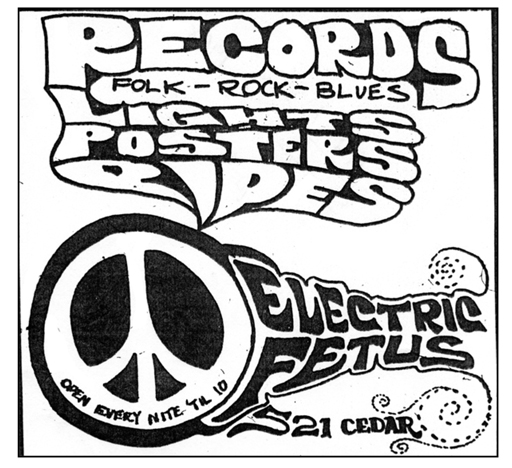
PROTEST HEADQUARTERS
The Fetus also functioned as a protest meeting place. When Dania Hall was forced to close in June 1968 after being denied its dance hall license, about 200 young adults gathered in front of the store to protest the closure of this Cedar-Riverside venue. (Minneapolis Tribune, July 4, 1968). Similarly, when Crosby, Stills & Nash demanded $5 to $10 for concert tickets (unheard of at the time), a protest and boycott arose, with students meeting at the Fetus. (Minneapolis Tribune, April 30, 1970)
1969
In 1969 Korsh sold his share to Keith Covart and went back to the University.
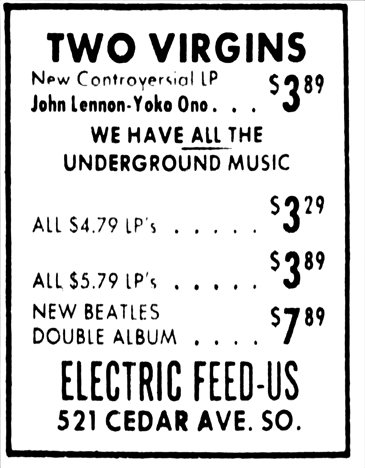
DICK AND PAT
On February 10, 1969, based on a complaint from one woman, a police officer appeared at the Fetus and demanded that the owners take down a poster from the store window. The poster was a caricature of John and Yoko’s “Two Virgins” with the heads of President Richard Nixon and his wife instead of the loving Lennons. Since this is a family website I will kowtow to anyone who would protest (my dad reads this) and censor the picture. Dan Foley refused to take it down, so the officer took the poster as evidence and referred the matter to the City Attorney. Foley accused the officer of taking property without a warrant, using “Gestapo tactics,” forcing his own morality on his store, and not paying the $1.03 for the poster. (Minneapolis Tribune, February 11, 1969)
The officer signed a complaint charging indecent conduct against owners Foley and Ron Korsh, and they were ordered not to display the poster where the public could see it until the mater was adjudicated. On February 28, 1969, the court threw out the charges, citing the First Amendment, deeming the poster not hard core pornography, and determining that the State did not have laws against such materials. (Minneapolis Star, March 1, 1969)
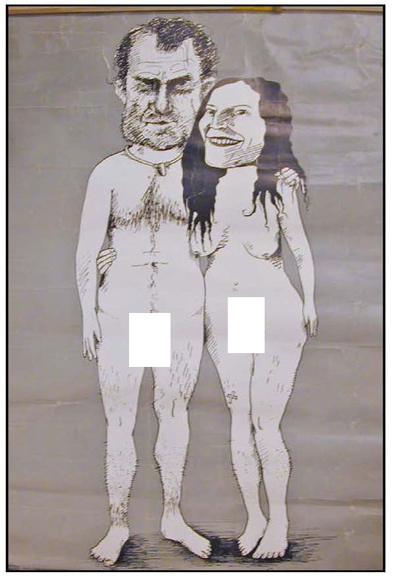
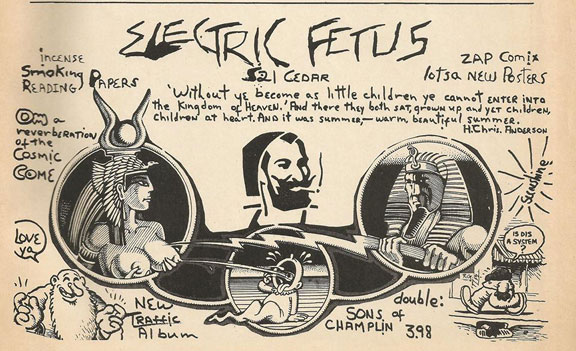
514 CEDAR AVE SO.
Notoriety (and low record prices) helped the store to grow, forcing it to seek larger quarters across the street. In October 1969 the store moved into 514 Cedar Ave. South, a building built in 1886.
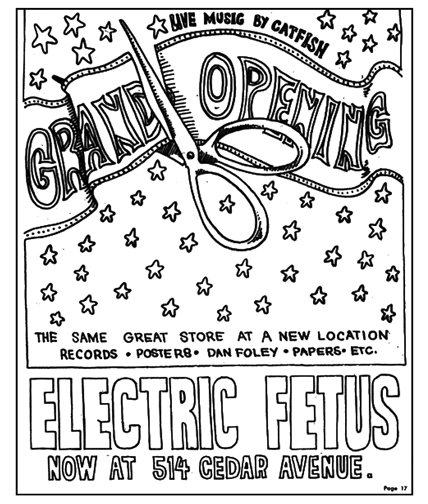
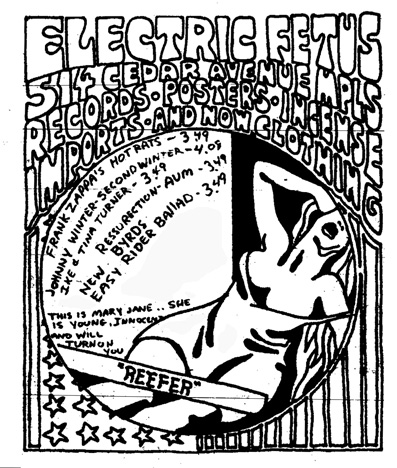
1970
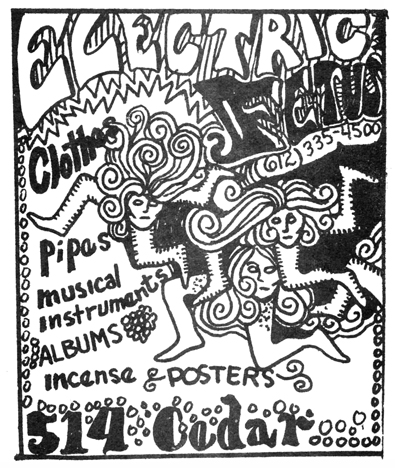
THE PEACE FLAG
On March 30, 1970, Covart was cited for displaying an American flag in the window of the shop that had a peace symbol where the stars should be. He plead not guilty, saying the flag was not an American flag and had never been one. (Minneapolis Tribune, April 7, 1970)
On June 4, 1970, the court agreed with Covart, saying that an American flag had 50 white stars on a field of blue, and since the item in question did not have those attributes, it was not a flag and was not desecrated. (Minneapolis Star, June 4, 1970)
A drawing of former Vice President Spiro Agnew as a hippie, created by John Miller (an artist for the Minneapolis Tribune), quickly became a best seller at the Fetus in November 1970. (Minneapolis Tribune, November 8, 1970 )
1971
Below is a photo of the shop taken in 1971 at 514 Cedar. That building was destroyed in a fire on January 1, 2014.
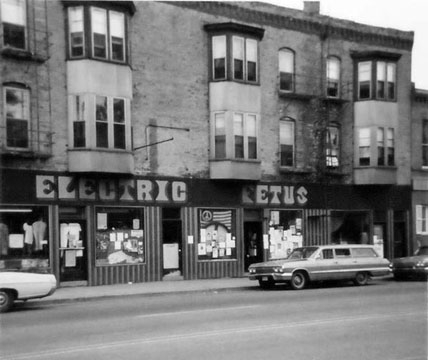
In 1971, the Cedar-Riverside neighborhood was targeted for redevelopment, starting with the Cedar Square West Apartments. The plans turned into a pitched battle between redevelopers and the residents of the West Bank who hated the idea of modern buildings in their 19th Century neighborhood. In an article about how people living and working on the West Bank felt about proposed development (most of which did not happen), Covart described the changes as potentially being “a super plastic, unlivable, almost unbearable situation.” (Minneapolis Tribune, January 31, 1971 )
1972
STREAKERS’ SALE
On Saturday, March 25, 1972, while the owners were away, the employees in charge dreamed up a “Streakers’ Sale,” offering free records and “stash pipes” to nude patrons. About 40 men and women showed up to claim their free merchandise. If a customer walked completely naked from the back of the store to the front, they could receive a free record. (Minneapolis Tribune, May 5, 1972)
The Minneapolis Star reported on May 5, 1972, that because of these hijinks (and several months of unpaid rent), the store’s landlord, University Community Properties, Inc. had moved to evict the store from the premises.
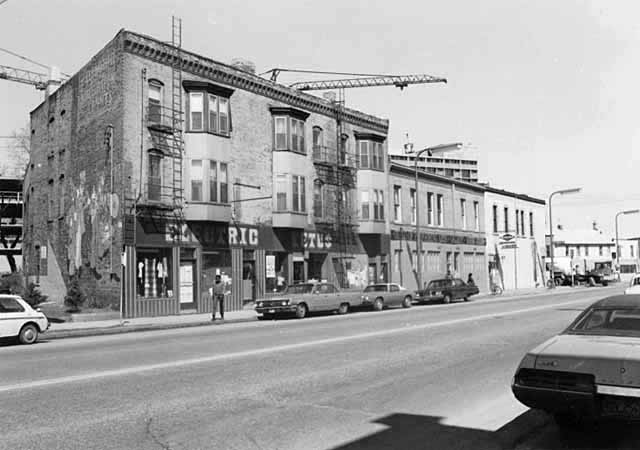
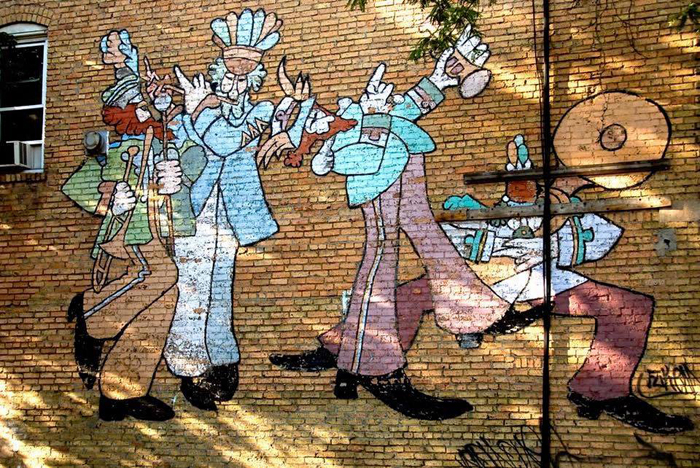
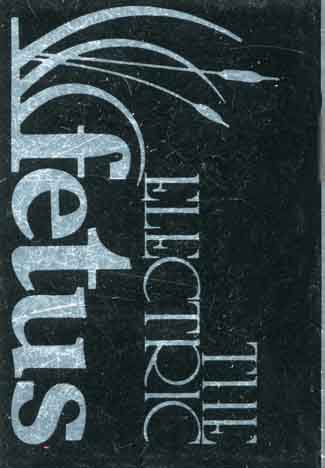
SOLIDARITY WITH STUDENT STRIKERS
In the spring of 1972, the University of Minnesota campus was shut down with a student strike against the war in Vietnam. The ad below shows the Fetus demonstrating solidarity with the strikers by giving patrons with red armbands a 10 percent discount.
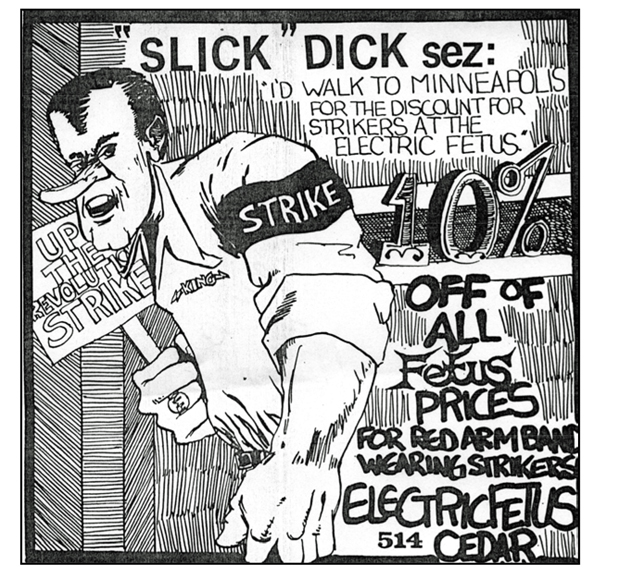
2000 FOURTH AVE. SOUTH
On June 4, 1972, the Fetus moved to its current location at 2000 Fourth Ave. South.
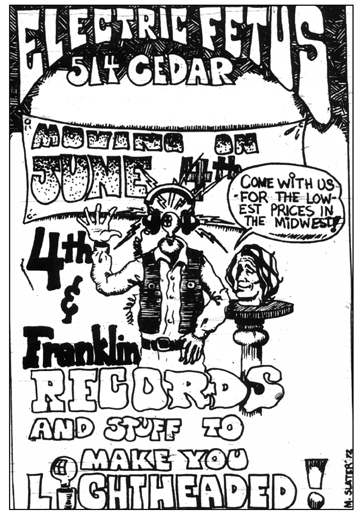
On October 30, 1972, the Electric Fetus filed articles of incorporation with the Minnesota Secretary of State.
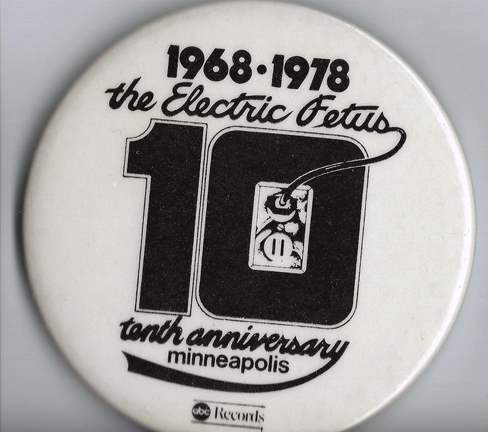
1978
Keith Covart obtained Dan Foley’s half interest in 1978, making Covart the sole owner.
1983
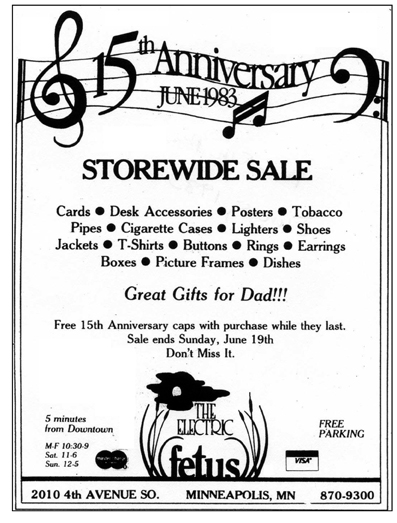
1994
In 1994 the store expanded to encompass 2000-2010 4th Ave. So. and Covart purchased the building. Today Electric Fetus still remains a Twin Cities music staple, offering everything from CDs to LPs of new and classic music, live in-store performances, as well as books, gifts and more.
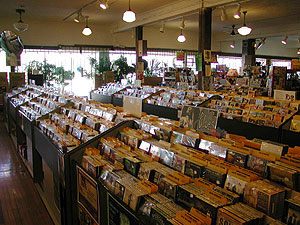
2010
On January 31, 2010, Ringo famously wore an Electric Fetus T-Shirt to the Grammy Awards while presenting the award for record of the year (which went to “Use Somebody” by Kings of Leon). He got the shirt from a nephew who lived in the Cities. (Minneapolis Star Tribune, February 1, 2010)
On September 16, 2010, Rolling Stone named the Fetus one of the best record stores in the country.
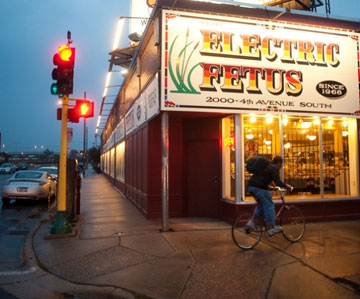
2011
In 2011, the Wall Street Journal named Electric Fetus one of the best vinyl-record stores in America, and City Pages consistently named it the best Twin Cities CD store for new music.
